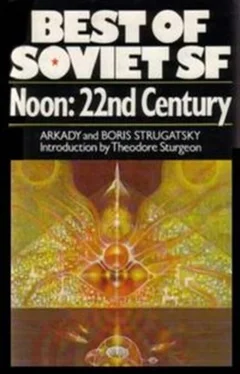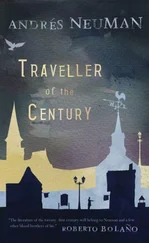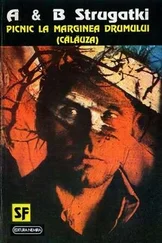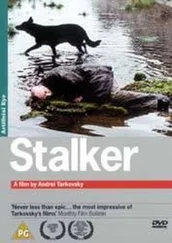Novago looked steadily to the right, at the gray crest of the dunes. Mandel was also looking to the right. Consequently, at first they didn’t notice the Pathfinders. The Pathfinders were also a pair, and they came up from the left.
“Hey there!” shouted the taller of the two.
The other, short, almost square, slung his carbine over his shoulder and waved.
“Whew!” Novago said with relief. “It’s Opanasenko and Morgan, the Canadian. Hey, comrades!” he shouted joyfully.
“Fancy meeting you here!” said the lanky Humphrey Morgan as he came up. “Good evening, doctor,” he said as he shook Mandel’s hand. “Good evening, doctor,” he repeated as he shook Novago’s.
“Hello, comrades,” boomed Opanasenko. “Fancy meeting you here.”
Before Novago could answer, Morgan said unexpectedly, “Thank you—it’s all healed,” and again stretched out his long arm to Mandel.
“What?” asked the perplexed Mandel. “I’m glad, whatever it is.”
“Oh, no, he’s still in camp,” said Morgan. “But he’s almost well too.”
“Why are you talking so strangely, Humphrey?” inquired Mandel, confused.
Opanasenko grabbed Morgan by the edge of his hood, drew him close, and shouted in his ear, “You’ve got everything wrong, Humphrey! You lose!”
Turning to the doctors, he explained that an hour before the Canadian had accidentally broken the diaphragms in his headphones, and now couldn’t hear, although he maintained that he could get along fine in the Martian atmosphere without the help of acoustic equipment. “He claims that he knows what people will say to him anyway. We made a bet, and he’s lost. Now he has to clean my carbine five times.”
Morgan laughed and said that the girl Galya at the base had nothing to do with anything. Opanasenko waved his hand hopelessly and asked, “You’re headed for the settlement, the biostation, I assume?”
“Yes,” said Novago. “To the Slavins.”
“Say, that’s right,” said Opanasenko. “They’ll really be wanting to see you. But why are you on foot?”
“What a pain in the neck!” said Morgan guiltily. “I can’t hear a blessed thing.”
Opanasenko again drew him over and shouted, “Hold on, Humphrey! I’ll tell you later!”
“Fine,” Morgan said in English. He walked off a few paces, looked around, and unslung his carbine. The Pathfinders had heavy double-barreled semiautomatics with magazines of twenty-five explosive bullets.
“Our crawler sank on us,” Novago said.
“Where?” Opanasenko quickly asked. “In a cavity?”
“Right. On the route, about forty kilometers out.”
“A cavity!” Opanasenko said joyously. “Do you hear, Humphrey? Another cavity!”
Humphrey Morgan stood with his back to them and turned his head within his hood, scanning the dark dunes.
“Okay,” said Opanasenko. “We’ll save that for later. So the crawler sank on you and you decided to go on foot? Are you armed?”
Mandel slapped his leg. “I’ve got this,” he said.
“Ri-ight,” said Opanasenko. “We’ll have to go with you. Humphrey! Damn—he can’t hear.”
“Hold it,” said Mandel. “Why all the fuss?”
“ It is around here somewhere,” said Opanasenko. “We’ve seen tracks.”
Mandel and Novago exchanged glances.
“Of course you know best, Fedor,” Novago said indecisively, “but I had supposed… After all, we are armed.”
“Madmen,” Opanasenko said with conviction. “You people at the base are, forgive me, simpletons. We warn you, we explain to you, and look what happens. At night. Through the desert. With pistols. What’s the matter—wasn’t Khlebnikov enough?”
Mandel shrugged. “I had thought that under the circumstances—” he began, but Morgan broke in, “Quiet!” and Opanasenko instantly unslung his carbine and took a position next to the Canadian.
Novago quietly let out a breath and slipped the pistol from his boot.
The sun was almost gone—a narrow yellow-green stripe shone over the black serrated silhouettes of the dunes. The whole sky had turned black, and there was a vast multitude of stars. Starlight glinted off the barrels of the carbines, and the doctors could see the barrels slowly moving right and left.
“My mistake—sorry,” Humphrey said, and they immediately started forward.
Opanasenko shouted in Morgan’s ear, “Humphrey, they’re going to Irina Slavina at the biostation! They need an escort!”
“Fine. I’ll go,” said Morgan.
“We’re going together!” shouted Opanasenko.
“Fine. We’ll go together.”
The doctors were still holding the pistols in their hands. Morgan turned to them, took a good look, and exclaimed, “Hey, no! Put them away.”
“Yes, please,” said Opanasenko. “Don’t even think of shooting. And put on your glasses.”
The Pathfinders were already wearing infrared glasses. Mandel shamefacedly shoved the pistol into the deep pocket of his coat and transferred the valise to his right hand. Novago hesitated a moment, then put his pistol back into the top of his left boot.
“Let’s go,” said Opanasenko. “We won’t take you by the regular route—we’ll go cross-country, through the excavations. It’s faster.”
Now Opanasenko, with the carbine under his arm, was walking in front and to the right of Mandel. Behind and to the right of Novago paced Morgan. His carbine hung on a long strap over his shoulder. Opanasenko walked quickly, cutting sharply to the west.
Through the infrared glasses the dunes looked black and white, and the sky empty and gray. It was like a drawing in lead pencil. The desert quickly fell behind, and the drawing showed less and less contrast, as if obscured by a cloud of smoke.
“Why are you so happy about our cavity, Fedor?” asked Mandel. “The water?”
“Well, what do you think?” Opanasenko said without turning around. “Water in the first place, and, second, one cavity we found turned out to be lined with flagstones.”
“Yes,” said Mandel. “Of course.”
“You’ll find a whole crawler in our cavity,” Novago muttered darkly.
Opanasenko suddenly made a sharp turn, and skirted round a level sandy area. At its edge stood a pole with a drooping flag.
“Quicksand,” Morgan said from behind. “Very dangerous.”
Quicksand was real trouble. A month ago, a special detachment of volunteer scouts had been organized to locate and mark all the quicksand patches in the vicinity of the base.
“But as I recall, Hasegawa proved that the appearance of those stone slabs could also be explained by natural forces,” said Mandel.
“Yes,” said Opanasenko, “that’s just the point.”
“Have you found anything lately?” asked Novago.
“No. They discovered oil in the east, and they found some very interesting fossils. But nothing in our line.”
They walked silently for some time. Then Mandel said thoughtfully, “It could be there’s nothing strange in that. Archaeologists on Earth deal with the remains of cultures that are at most hundreds of thousands of years old. But here they’re tens of millions. On the contrary, it would be strange if—”
“Well, we’re not complaining much,” Opanasenko interrupted. “After all, we got such a fat tidbit right off—two artificial satellites. We didn’t even have to dig. But then,” he added after a pause, “looking is just as interesting as finding.”
“Especially since the area you’ve already gone over is so small,” said Mandel.
He stumbled and almost fell. Morgan said in an undertone, “Doctor Novago, Doctor Mandel, I suspect you’re talking all the time. You shouldn’t do that right now. Ask Fedor if you don’t believe me.”
Читать дальше












